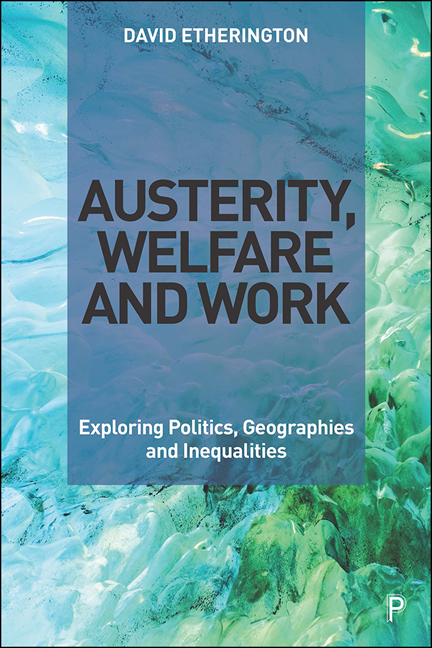Book contents
- Frontmatter
- Dedication
- Contents
- List of Tables and Box
- List of Abbreviations
- Notes on the Author
- Acknowledgements
- Preface
- 1 Introduction: the Crisis and Austerity Neoliberalism
- 2 Conceptualising Austerity, Welfare and Employment Relations
- 3 Embedding Neoliberal Austerity: from New Labour to the Conservative Government
- 4 Resisting Welfare Reforms and Work-First Policies
- 5 ‘Devolving’ Welfare Policies in Greater Manchester’s Precarious Economy
- 6 Challenging Welfare Conditionality and Insecure Work
- 7 Towards a more Inclusive Labour Market: Lessons from Denmark
- 8 Conclusions: Progressive Alternatives to Austerity
- Notes
- References
- Index
5 - ‘Devolving’ Welfare Policies in Greater Manchester’s Precarious Economy
Published online by Cambridge University Press: 10 March 2021
- Frontmatter
- Dedication
- Contents
- List of Tables and Box
- List of Abbreviations
- Notes on the Author
- Acknowledgements
- Preface
- 1 Introduction: the Crisis and Austerity Neoliberalism
- 2 Conceptualising Austerity, Welfare and Employment Relations
- 3 Embedding Neoliberal Austerity: from New Labour to the Conservative Government
- 4 Resisting Welfare Reforms and Work-First Policies
- 5 ‘Devolving’ Welfare Policies in Greater Manchester’s Precarious Economy
- 6 Challenging Welfare Conditionality and Insecure Work
- 7 Towards a more Inclusive Labour Market: Lessons from Denmark
- 8 Conclusions: Progressive Alternatives to Austerity
- Notes
- References
- Index
Summary
Broadly, the approach to public service provision continues to be one of outsourcing the delivery of services to private contractors, sometimes with the use of payment-by-results mechanisms, such as in the working well employment support scheme. In employment support, this is a requirement of the devolution deals, and there is therefore little space for change. Research into outsourcing has demonstrated that this risks both waste and inefficiency, and increases the influence of corporate interests over politics. (NEF, 2017: 15)
Introduction
The inception of a Mayoral Combined Authority, following a number of stages of deal-making, has seen Greater Manchester's ‘Devo- Manc’ in the vanguard of recent English devolution debates (Greater Manchester comprises the local authorities of Manchester, Bolton, Bury, Salford, Trafford, Stockport, Wigan, Oldham, Rochdale and Tameside). The devolution agreements relate to economic growth and the management/coordination of health, social care and welfare (Hincks et al, 2017). This chapter will focus on the restructuring of the economy and employment relations, and how this is linked with the way welfare and local government policies are being configured by austerity within the city region. The true problems and crisis of Universal Credit (UC) and how they impact on employment relations are only fully grasped by understanding the process of roll-out in regions, localities and devolved settings.
Some scholars have focused on how austerity involves the ‘downloading’ of expenditure cuts on to cities, giving rise to fiscal crises and retrenchment reinforcing labour market insecurity (see Hastings et al, 2017; Pike et al, 2018). This critical engagement and focus are extended in this chapter to include an investigation of how social and institutional actors exercise agency within cities in terms of contestation and negotiation (Meegan et al, 2014). Attention is drawn to the role of trade unions, which still have a voice within the growth agendas, particularly in terms of the increasingly precarious nature of the economy. The focus of the chapter is also on the way local authorities operate as regulatory intermediaries (and sites of social reproduction), adapting, responding and reacting to austerity crisis. In this respect, local authorities will devise various strategies to protect the poor and disadvantaged groups who tend to depend on local authority services (see Donald et al, 2014; Fuller, 2018).
- Type
- Chapter
- Information
- Austerity, Welfare and WorkExploring Politics, Geographies and Inequalities, pp. 93 - 114Publisher: Bristol University PressPrint publication year: 2020



